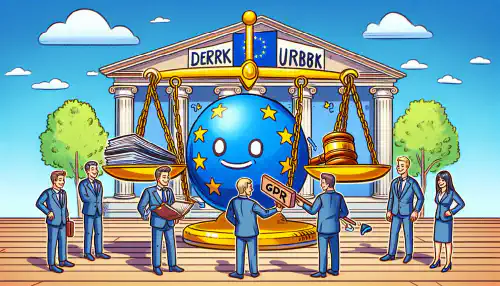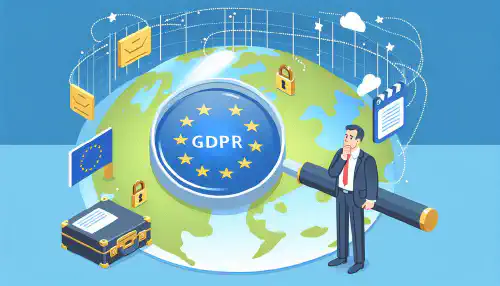Mastering GDPR Compliance: A Cybersecurity Expert’s Guide for Non-EU Businesses in 2024

Table of Contents
Understanding GDPR: A Guide for Non-EU Businesses
The General Data Protection Regulation (GDPR) is a comprehensive data protection law that was implemented by the European Union (EU) in 2018. While it primarily applies to businesses within the EU, it also has significant implications for non-EU businesses that process the personal data of EU residents. This guide aims to provide an understanding of GDPR for non-EU businesses and outline the key compliance requirements, implications, steps to achieve compliance, and challenges faced by these businesses. By following the guidelines and best practices outlined in this guide, non-EU businesses can ensure they are compliant with GDPR and build trust with their EU customers.
Key Takeaways
- GDPR is a comprehensive data protection law implemented by the EU.
- Non-EU businesses processing personal data of EU residents are also subject to GDPR.
- Compliance requirements include appointing a Data Protection Officer and ensuring lawful basis for processing.
- Data subjects have rights such as consent withdrawal and data breach notification.
- Non-compliance with GDPR can result in significant penalties and reputational damage.
Overview of GDPR
History and Purpose of GDPR
The history and purpose of the General Data Protection Regulation (GDPR) is of utmost importance for non-EU businesses to understand. GDPR was introduced by the European Union (EU) in 2018 to strengthen the protection of personal data and privacy rights of individuals within the EU. It aims to harmonize data protection laws across EU member states and provide individuals with greater control over their personal data.
Key points regarding the history and purpose of GDPR:
- GDPR was enacted to replace the outdated Data Protection Directive 95/46/EC and address the challenges posed by technological advancements and globalization.
- The regulation was developed over several years of consultation and negotiation, involving various stakeholders, including privacy advocates, businesses, and government representatives.
- The primary objectives of GDPR are to enhance the rights of individuals, promote transparency and accountability in data processing, and establish a level playing field for businesses operating within the EU.
By understanding the history and purpose of GDPR, non-EU businesses can better comprehend the rationale behind its provisions and ensure compliance with the regulation.
Key Principles of GDPR
As a cybersecurity expert, it is crucial to understand the key principles of GDPR. These principles serve as the foundation for the regulation and guide organizations in their compliance efforts. The key principles of GDPR include:
Lawfulness, Fairness, and Transparency: Organizations must process personal data lawfully, fairly, and in a transparent manner. This means that individuals must be informed about how their data will be used and have a clear understanding of their rights.
Purpose Limitation: Personal data should only be collected for specified, explicit, and legitimate purposes. Organizations should not use the data for any other purposes without obtaining additional consent.
Data Minimization: Organizations should only collect and retain personal data that is necessary for the intended purpose. They should avoid collecting excessive or irrelevant data.
Accuracy: Organizations are responsible for ensuring the accuracy of the personal data they process. They should take reasonable steps to keep the data up to date and rectify any inaccuracies.
Storage Limitation: Personal data should be kept in a form that allows identification of individuals for no longer than necessary. Organizations should establish retention periods and delete or anonymize data when it is no longer needed.
Integrity and Confidentiality: Organizations must implement appropriate security measures to protect personal data against unauthorized access, disclosure, alteration, or destruction.
Accountability: Organizations are accountable for their data processing activities. They should be able to demonstrate compliance with GDPR and have mechanisms in place to respond to data subject requests and data breaches.
By adhering to these key principles, non-EU businesses can ensure that they are handling personal data in a lawful, ethical, and secure manner.
Scope and Applicability of GDPR
The scope and applicability of the General Data Protection Regulation (GDPR) is extensive and applies to both EU and non-EU businesses that process personal data of individuals residing in the EU. It is crucial for non-EU businesses to understand the reach of GDPR to ensure compliance and protect the privacy rights of EU data subjects.
Key Points:
- GDPR applies to non-EU businesses that offer goods or services to individuals in the EU or monitor their behavior.
- Personal data includes any information that can directly or indirectly identify an individual, such as names, addresses, email addresses, IP addresses, and even cookie data.
- The regulation applies regardless of where the processing takes place, as long as it involves the personal data of EU residents.
Table: Scope and Applicability of GDPR
| Scope | Applicability |
|---|---|
| EU | Applies |
| Non-EU | Applies |
Tip: Non-EU businesses should carefully assess their data processing activities to determine if they fall within the scope of GDPR. Seeking legal advice can help clarify any uncertainties and ensure compliance.
Non-EU businesses must understand that GDPR has a broad reach and applies to various scenarios, including offering goods or services to individuals in the EU or monitoring their behavior. It is essential to identify and protect personal data, regardless of its format or location, to comply with GDPR requirements. Seeking legal guidance and conducting thorough data assessments are crucial steps in achieving compliance.
Compliance Requirements for Non-EU Businesses

Data Protection Officer (DPO)
As a cybersecurity expert, the role of the Data Protection Officer (DPO) is crucial in ensuring compliance with the General Data Protection Regulation (GDPR). The DPO is responsible for overseeing the organization’s data protection strategy and implementation, as well as advising on data protection impact assessments and monitoring compliance with GDPR requirements.
Key points regarding the role of the DPO include:
- Independence: The DPO should operate independently and report directly to the highest level of management to avoid conflicts of interest.
- Expertise: The DPO should possess expert knowledge of data protection laws and practices, as well as an understanding of the organization’s operations and data processing activities.
- Responsibilities: The DPO is responsible for educating employees on GDPR requirements, conducting audits and assessments, and acting as a point of contact for data subjects and supervisory authorities.
To ensure the effectiveness of the DPO role, organizations may consider establishing a clear reporting structure, providing adequate resources and support, and fostering a culture of data protection awareness and accountability.
Tip: It is important for organizations to carefully select and empower their DPO to fulfill their responsibilities effectively and ensure compliance with GDPR.
Lawful Basis for Processing
As a cybersecurity expert, understanding the lawful basis for processing personal data is crucial for non-EU businesses seeking GDPR compliance. The lawful basis determines the legal grounds on which personal data can be processed. There are six lawful bases outlined in Article 6 of the GDPR:
- Consent: Obtaining explicit and informed consent from individuals to process their personal data.
- Contractual Necessity: Processing personal data that is necessary for the performance of a contract with the data subject.
- Legal Obligation: Processing personal data to comply with a legal obligation.
- Vital Interests: Processing personal data to protect someone’s life.
- Public Task: Processing personal data to perform an official function or task carried out in the public interest.
- Legitimate Interests: Processing personal data for legitimate interests pursued by the data controller or a third party, except where overridden by the interests, rights, and freedoms of the data subject.
It is important for non-EU businesses to carefully consider and document the lawful basis for each processing activity. This ensures transparency and accountability in data processing practices, as well as compliance with the GDPR.
To help businesses determine the appropriate lawful basis, the Information Commissioner’s Office (ICO) provides guidance and examples for each basis. It is recommended to consult this guidance and seek legal advice if needed.
Consent and Data Subject Rights
Consent and data subject rights are crucial aspects of the General Data Protection Regulation (GDPR). Under the GDPR, organizations must obtain explicit and informed consent from individuals before processing their personal data. This means that individuals must be fully aware of the purposes for which their data will be used and give their consent freely. Additionally, individuals have the right to withdraw their consent at any time. Organizations must also provide individuals with clear and transparent information about their data processing activities, including the legal basis for processing and the rights of data subjects.
To ensure compliance with consent and data subject rights under the GDPR, organizations should:
- Implement a robust consent management system that allows individuals to easily give, withdraw, and manage their consent.
- Regularly review and update privacy policies to ensure they are clear, concise, and easily accessible.
- Provide individuals with mechanisms to exercise their data subject rights, such as the right to access, rectify, and erase their personal data.
- Establish procedures for handling data subject requests and ensure timely responses.
It is important for organizations to understand and adhere to the consent and data subject rights requirements of the GDPR to protect the privacy and rights of individuals.
Data Breach Notification
Data breach notification is a crucial aspect of GDPR compliance. In the event of a data breach, non-EU businesses must promptly notify the relevant supervisory authority and affected individuals. Timely and accurate notification is essential to mitigate the potential harm caused by the breach and demonstrate compliance with GDPR requirements . The notification should include details such as the nature of the breach, the categories of personal data affected, the potential consequences, and the measures taken to address the breach. Failure to comply with the data breach notification requirements can result in significant penalties.
International Data Transfers
International data transfers refer to the transfer of personal data from the European Union (EU) to countries outside the EU. These transfers are subject to specific requirements under the General Data Protection Regulation (GDPR) to ensure the protection of individuals’ personal data.
Key Considerations for International Data Transfers:
Adequacy Decisions: The European Commission has the authority to determine whether a country outside the EU provides an adequate level of data protection. If a country is deemed adequate, personal data can be transferred without additional safeguards.
Standard Contractual Clauses (SCCs): SCCs are pre-approved contractual clauses that organizations can use to ensure adequate protection when transferring personal data to countries without an adequacy decision.
Binding Corporate Rules (BCRs): BCRs are internal rules adopted by multinational organizations that allow for the transfer of personal data within the organization, ensuring a consistent level of protection.
Derogations: In certain situations, organizations may rely on derogations to transfer personal data internationally. These derogations include explicit consent, performance of a contract, and the protection of vital interests.
Tips for Ensuring Compliance with International Data Transfers:
Conduct a thorough assessment of the data transfer requirements under the GDPR.
Identify the appropriate legal basis for the transfer, such as adequacy decisions, SCCs, or BCRs.
Implement appropriate technical and organizational measures to protect the personal data during the transfer.
Document the data transfer activities and maintain records to demonstrate compliance.
It is crucial for non-EU businesses to understand and comply with the GDPR’s requirements for international data transfers. Failure to do so can result in significant penalties and reputational damage.
Regularly review and update data transfer processes to ensure ongoing compliance with the GDPR.
Stay informed about any changes or updates to the GDPR and adjust data transfer practices accordingly.
Implications of GDPR for Non-EU Businesses

Impact on Marketing and Advertising
The General Data Protection Regulation (GDPR) has significant implications for marketing and advertising activities of non-EU businesses. Compliance with GDPR requires businesses to obtain explicit and informed consent from individuals before processing their personal data for marketing purposes. This means that businesses must clearly explain how the data will be used and give individuals the option to opt out.
Key points:
- Businesses must obtain explicit and informed consent from individuals before processing their personal data for marketing purposes.
- Individuals must be given the option to opt out of marketing communications.
- Businesses must clearly explain how the data will be used for marketing purposes.
Failure to comply with GDPR can result in severe penalties, including fines of up to 4% of annual global turnover or €20 million, whichever is higher.
Tip: Non-EU businesses should review their marketing and advertising practices to ensure compliance with GDPR. This may involve updating privacy policies, implementing mechanisms for obtaining consent, and providing individuals with the option to opt out of marketing communications.
Data Protection Impact Assessments
Data Protection Impact Assessments (DPIAs) are a crucial aspect of GDPR compliance for non-EU businesses. DPIAs are a systematic process to identify and minimize the data protection risks of a project or activity. They help organizations assess the impact of their data processing activities on individuals’ privacy rights and determine the appropriate measures to mitigate any potential risks.
DPIAs involve a comprehensive analysis of the data processing operations, including the types of data collected, the purposes of processing, the security measures in place, and the potential risks to individuals’ rights and freedoms. The assessment also considers the necessity and proportionality of the data processing, ensuring that organizations only collect and process the data that is necessary for the intended purpose.
To conduct a DPIA effectively, non-EU businesses should follow these steps:
- Identify the need for a DPIA: Determine whether a project or activity involves high-risk data processing that requires a DPIA.
- Describe the processing: Document the details of the data processing activities, including the purposes, categories of data, recipients, and retention periods.
- Assess the necessity and proportionality: Evaluate whether the data processing is necessary and proportionate to achieve the intended purpose.
- Identify and assess risks: Identify potential risks to individuals’ rights and freedoms and assess the likelihood and severity of these risks.
- Mitigate risks: Implement measures to minimize the identified risks, such as encryption, pseudonymization, or access controls.
- Consult with stakeholders: Seek input from relevant stakeholders, such as data subjects, data protection officers, or other experts.
- Document the DPIA: Maintain a record of the DPIA, including the findings, measures implemented, and any decisions made.
By conducting DPIAs, non-EU businesses can demonstrate their commitment to protecting individuals’ privacy rights and ensure compliance with GDPR requirements. DPIAs also help organizations identify and address potential data protection risks proactively, enhancing their overall cybersecurity posture.
Accountability and Record-Keeping
Accountability and record-keeping are crucial aspects of GDPR compliance. Non-EU businesses must demonstrate their ability to be accountable for the personal data they process and maintain accurate records of their data processing activities. This includes documenting the legal basis for processing personal data, the purposes of processing, and the categories of data subjects and personal data involved. General Data Protection Regulation (GDPR) requires businesses to keep records of their data processing activities to ensure transparency and accountability .
Penalties and Enforcement
Non-compliance with the General Data Protection Regulation (GDPR) can result in severe penalties and enforcement actions. It is crucial for non-EU businesses to understand the potential consequences of failing to comply with GDPR requirements. Fines for non-compliance can be substantial, with the maximum penalty being up to €20 million or 4% of the global annual turnover, whichever is higher.
Enforcement of GDPR is carried out by supervisory authorities in each EU member state. These authorities have the power to investigate and impose penalties on non-compliant businesses. They can conduct audits, issue warnings, and order corrective measures to ensure compliance.
To avoid penalties and enforcement actions, non-EU businesses should prioritize GDPR compliance and take the necessary steps to protect personal data. This includes implementing robust data protection measures, conducting regular audits, and training employees on GDPR requirements.
Tips for GDPR compliance:
- Regularly review and update privacy policies and procedures to ensure they align with GDPR requirements.
- Establish a data protection officer (DPO) role within the organization to oversee GDPR compliance.
- Implement data breach notification procedures to promptly report any breaches to the supervisory authorities.
- Conduct data protection impact assessments (DPIAs) to identify and mitigate potential risks to personal data.
- Stay informed about regulatory changes and updates to ensure ongoing compliance with GDPR.
By adhering to GDPR requirements and prioritizing data protection, non-EU businesses can minimize the risk of penalties and enforcement actions, build trust with EU customers, and demonstrate their commitment to safeguarding personal data.
Building Trust with EU Customers
As a cybersecurity expert, building trust with EU customers is crucial for non-EU businesses seeking GDPR compliance. Trust is the foundation of any successful business relationship, and it becomes even more important when dealing with personal data. To establish trust, businesses should:
- Implement robust security measures to protect customer data from unauthorized access or breaches.
- Be transparent about their data processing practices and inform customers about how their personal data is collected, stored, and used.
- Obtain explicit consent from customers before processing their personal data and provide them with the option to withdraw consent at any time.
- Ensure data accuracy by regularly updating and validating customer information.
- Enable data subject rights by providing mechanisms for customers to access, rectify, and delete their personal data.
By following these practices, non-EU businesses can demonstrate their commitment to data protection and build trust with EU customers.
Steps to Achieve GDPR Compliance

Conducting a Data Audit
Conducting a thorough data audit is a crucial step for non-EU businesses seeking GDPR compliance. A data audit involves assessing and documenting the personal data that is collected, processed, and stored by the organization. It helps identify any potential risks and vulnerabilities in data handling practices. Here are some key points to consider when conducting a data audit:
- Identify the types of personal data collected and the purposes for which it is processed.
- Determine the legal basis for processing the data, such as consent or legitimate interests.
- Assess the security measures in place to protect the data from unauthorized access or breaches.
- Evaluate the data retention policies and ensure compliance with GDPR requirements.
- Document the data flows within the organization, including any transfers to third parties or countries outside the EU.
Conducting a data audit provides a comprehensive understanding of the organization’s data processing activities and helps identify areas that require improvement to ensure GDPR compliance.
Implementing Privacy Policies and Procedures
As a cybersecurity expert, implementing privacy policies and procedures is crucial for ensuring compliance with the GDPR. Privacy policies outline how an organization collects, uses, and protects personal data, while procedures provide a framework for handling data securely. Here are some key considerations when implementing privacy policies and procedures:
- Transparency: Clearly communicate to individuals how their data will be processed and for what purposes. This can be achieved through concise and easily understandable language in privacy policies.
- Lawful Basis: Identify the lawful basis for processing personal data, such as consent, contractual necessity, or legitimate interests. Document the chosen basis in privacy policies.
- Data Minimization: Only collect and retain the minimum amount of personal data necessary for the intended purpose. This reduces the risk of unauthorized access or misuse.
- Data Security: Implement appropriate technical and organizational measures to protect personal data from unauthorized access, alteration, or destruction.
- Data Retention: Establish clear retention periods for different types of personal data and regularly review and delete data that is no longer necessary.
Tip: Regularly review and update privacy policies and procedures to ensure they align with evolving GDPR requirements and reflect any changes in the organization’s data processing activities.
Training Employees on GDPR
Training employees on GDPR is crucial for non-EU businesses to ensure compliance and protect the personal data of individuals. It is important to educate employees about the key principles and requirements of GDPR, as well as their roles and responsibilities in safeguarding data.
Implementing a comprehensive training program can help employees understand the importance of data protection and the potential risks associated with non-compliance. The training should cover topics such as:
- The principles of GDPR and how they apply to the organization
- The lawful basis for processing personal data
- The rights of data subjects and how to handle data subject requests
- The importance of obtaining valid consent
- The procedures for reporting and handling data breaches
By training employees on GDPR, businesses can ensure that their staff is prepared for the GDPR and equipped with the knowledge and skills to handle personal data in a secure and compliant manner.
Establishing Data Protection Measures
Establishing robust data protection measures is crucial for non-EU businesses to ensure compliance with the General Data Protection Regulations (GDPR). These measures are designed to safeguard personal data and protect the privacy rights of individuals. By implementing effective data protection measures, businesses can mitigate the risk of data breaches and demonstrate their commitment to data security.
Regularly Reviewing and Updating Compliance
Regularly reviewing and updating compliance is crucial for non-EU businesses to ensure ongoing adherence to the requirements of the GDPR. By regularly reviewing their compliance measures, businesses can identify any gaps or areas for improvement and take appropriate action to address them. This helps to minimize the risk of non-compliance and potential penalties. Additionally, staying up-to-date with any changes or updates to the GDPR is essential to ensure that businesses are aware of any new obligations or requirements that may affect their operations.
Challenges and Best Practices for Non-EU Businesses

Navigating Cross-Border Data Transfers
As a cybersecurity expert, navigating cross-border data transfers is a critical aspect of GDPR compliance for non-EU businesses. The GDPR imposes strict regulations on the transfer of personal data outside the European Economic Area (EEA) to ensure the protection of individuals’ privacy and data security.
To successfully navigate cross-border data transfers, non-EU businesses should consider the following:
Assess the Adequacy: Determine if the destination country has been deemed adequate by the European Commission. Adequate countries have data protection laws that are considered equivalent to the GDPR.
Implement Appropriate Safeguards: If the destination country is not deemed adequate, implement appropriate safeguards such as Standard Contractual Clauses (SCCs) or Binding Corporate Rules (BCRs) to ensure the protection of personal data.
Obtain Explicit Consent: Obtain explicit consent from data subjects for the transfer of their personal data to non-adequate countries.
Monitor Third-Party Transfers: Ensure that any third parties involved in the transfer of personal data also comply with GDPR requirements.
Maintain Documentation: Keep detailed documentation of cross-border data transfers, including the legal basis for the transfer, the safeguards implemented, and any relevant data protection impact assessments.
By following these steps, non-EU businesses can navigate cross-border data transfers in compliance with the GDPR and protect the privacy and security of individuals’ personal data.
Managing Consent and Data Subject Requests
As a cybersecurity expert, managing consent and data subject requests is a crucial aspect of GDPR compliance for non-EU businesses. It involves ensuring that individuals have control over their personal data and can exercise their rights under the GDPR. Here are some key considerations:
- Consent: Non-EU businesses must obtain valid and explicit consent from individuals before processing their personal data. This consent should be freely given, specific, informed, and unambiguous.
- Data Subject Rights: Non-EU businesses need to be aware of the various rights granted to data subjects under the GDPR, such as the right to access, rectify, and erase their personal data.
- Managing Requests: Non-EU businesses should establish processes and procedures to handle data subject requests effectively. This includes verifying the identity of the requester and responding within the specified timeframes.
It is important for non-EU businesses to prioritize the management of consent and data subject requests to ensure compliance with the GDPR and maintain trust with individuals whose data they process.
Ensuring Vendor and Third-Party Compliance
As a cybersecurity expert, ensuring vendor and third-party compliance is crucial for non-EU businesses to achieve GDPR compliance. Non-EU businesses often rely on vendors and third-party service providers to process personal data of clients . It is important to establish strong contractual agreements with these vendors to ensure they also comply with GDPR requirements. Here are some key considerations for ensuring vendor and third-party compliance:
Addressing Data Protection in Cloud Computing
Cloud computing has become an integral part of many businesses, offering numerous benefits such as scalability, cost-efficiency, and flexibility. However, data protection in the cloud presents unique challenges, particularly for non-EU businesses. It is crucial for organizations to understand and address these challenges to ensure compliance with the General Data Protection Regulation (GDPR).
Staying Up-to-Date with Regulatory Changes
To stay compliant with the GDPR, non-EU businesses must actively monitor and adapt to regulatory changes. This is particularly important for individuals in the EU, as their data protection rights are directly affected by any updates to the legislation. Here are some key strategies for staying up-to-date with regulatory changes:
Challenges and Best Practices for Non-EU Businesses. As the world becomes increasingly interconnected, businesses outside the European Union face unique challenges when it comes to cybersecurity and data privacy. With the ever-evolving threat landscape, it is crucial for non-EU businesses to stay ahead and protect their valuable assets. At simeononsecurity.com , we provide expert insights and resources to help businesses navigate these challenges. Our website covers a wide range of topics including cybersecurity, automation, and crypto. Whether you are looking for the latest trends or best practices, simeononsecurity.com is your essential resource. Visit our website today to discover expert security and insights and stay ahead in the world of cybersecurity.
Conclusion
In conclusion, understanding and complying with the General Data Protection Regulation (GDPR) is crucial for non-EU businesses operating in today’s global digital landscape. The GDPR, with its history, purpose, and key principles, aims to protect the privacy and rights of individuals within the European Union. Its scope and applicability extend beyond EU borders, impacting businesses worldwide.
To achieve GDPR compliance, non-EU businesses must navigate various compliance requirements, such as appointing a Data Protection Officer (DPO), establishing lawful bases for processing personal data, obtaining valid consent, and promptly notifying authorities of data breaches. Additionally, international data transfers require careful consideration to ensure adequate safeguards.
The implications of GDPR for non-EU businesses are far-reaching. Marketing and advertising practices must align with GDPR requirements, and data protection impact assessments should be conducted to identify and mitigate risks. Accountability and record-keeping play a crucial role in demonstrating compliance, while penalties and enforcement mechanisms serve as deterrents for non-compliance.
To achieve and maintain GDPR compliance, non-EU businesses should undertake steps such as conducting regular data audits, implementing robust privacy policies and procedures, training employees on GDPR principles, establishing data protection measures, and staying updated with regulatory changes.
However, non-EU businesses also face challenges in navigating cross-border data transfers, managing consent and data subject requests, ensuring vendor and third-party compliance, addressing data protection in cloud computing, and staying up-to-date with evolving regulations. By adopting best practices and seeking expert guidance, non-EU businesses can overcome these challenges and build trust with EU customers.
Overall, the GDPR represents a significant shift in data protection regulations, emphasizing the importance of privacy and individual rights. Non-EU businesses must proactively understand and comply with the GDPR to navigate the complexities of the global digital landscape and foster trust with EU customers.
Frequently Asked Questions
What is the purpose of GDPR?
The purpose of GDPR is to protect the privacy and personal data of individuals within the European Union (EU) and to regulate the processing and transfer of their personal data.
Who does GDPR apply to?
GDPR applies to any organization that processes the personal data of individuals within the EU, regardless of the organization’s location.
What are the key principles of GDPR?
The key principles of GDPR include the lawful, fair, and transparent processing of personal data, purpose limitation, data minimization, accuracy, storage limitation, integrity and confidentiality, and accountability.
What is a Data Protection Officer (DPO)?
A Data Protection Officer (DPO) is a designated person within an organization who is responsible for ensuring GDPR compliance and acting as a point of contact for data subjects and supervisory authorities.
What is the lawful basis for processing personal data under GDPR?
The lawful basis for processing personal data under GDPR includes consent, contract performance, legal obligation, vital interests, public task, and legitimate interests.
What are the penalties for non-compliance with GDPR?
The penalties for non-compliance with GDPR can be significant, including fines of up to €20 million or 4% of the global annual turnover, whichever is higher.






